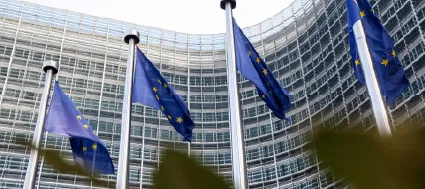Rethinking the Rule of Law in EU Economic Governance: Insights from the 2025 Report
July 29, 2025
On 8 July, 2025 the European Commission published its sixth annual Rule of Law Report, assessing developments across all Member States. This is the first report issued under the new Commission mandate reaffirming the EU’s commitment to upholding the rule of law across the EU and beyond. In a time of rising geopolitical instability and growing pressure on democratic institutions globally, the Commission reaffirms that rule of law remains a cornerstone of the EU’s internal and external policies and actions.
Building on its longstanding commitment to uphold the rule of law, the 2025 Rule of Law Report introduces a dedicated Single Market dimension, underlining the rule of law as a cornerstone for legal certainty, investor confidence, and economic stability. This new focus addresses challenges businesses, particularly SMEs, face when operating across borders and aims to ensure the impartial application of EU law. Implicitly, it also strengthens the role of competition law in safeguarding fair, open markets, and consistent, rule of law-based enforcement across all Member States. A predictable legal environment, supported by effective justice systems, anti-corruption measures, independent oversight, and transparent media, is essential for the Single Market’s proper functioning and the EU’s global competitiveness.
Embedding Rule of Law in EU Economic Governance
The Report reflects a deliberate political choice by the European Commission to integrate economic governance more closely with rule of law principles. It examines how rule of law conditions affect key areas such as lawmaking, public procurement, and regulatory stability—factors crucial for institutional trust, social cohesion, and economic resilience.
This development responds directly to the political priorities set out by Commission President Ursula von der Leyen. In her political guidelines and in the mission letter to Commissioner Michael McGrath, she reaffirmed the rule of law as a central commitment for the new College, emphasizing that “Europe’s democracy and economy relies on justice and the rule of law”. The decision to expand the annual Rule of Law Report to include a dedicated Single Market dimension underscores this dual commitment.
Economic dimension of the Rule of law
Recognizing the rule of law as “the cornerstone for translating EU values into tangible benefits for Europeans”, the Report positions it as a vital tool for policies that drive competitiveness and empower societal and economic participation across the Union. The Commission underlines that legal certainty, judicial independence, and transparent governance are essential conditions for attracting investment, boosting economic performance, and ensuring that citizens and businesses can fully benefit from the freedoms of the Single Market.
With such framing, the European Commission is clearly articulating a broadened understanding of the rule of law, not just as a safeguard for democratic institutions, but as a foundational enabler of economic and social objectives. Hence, the Report acknowledges that the rule of law is not only essential for the functioning of the EU legal order, but it is also a fundamental prerequisite for the functioning of the EU internal market. It promotes economic growth and prosperity through ensuring legal certainty, stability, predictability, fairness and uniform application of EU law across Member States.
Recognising this, the European Economic and Social Committee (EESC) has been, over the past five year, calling for the addition of a fifth pillar to the Rule of Law Report to better capture its economic dimension. The EESC emphasized that protectionist practices and discriminatory measures against foreign investors in some Member States undermine investment, distort competition, and hinder trade within the internal market.
Mainstreaming or Instrumentalising? Rule of Law in the EU’s Competitiveness Agenda
Importantly, by positioning the rule of law as a core pillar of the EU’s new competitiveness agenda, as outlined in the Competitiveness Compass and the broader vision set out in the Draghi Report, the Report goes beyond merely linking it to the functioning of the Single Market. It elevates the rule of law to a strategic component of the EU’s emerging new economic model, signalling its increasing instrumentalisation as a device for competitiveness, rather than solely a normative or constitutional principle.
Such increasing emphasis on the Single Market and competitiveness in the 2025 Rule of Law Report raises important questions about how the EU conceptualizes the relationship between the rule of law, economic governance, and strategic competitiveness. By linking the rule of law to the functioning of the Single Market, competitiveness, and investor confidence, the EU appears to be redefining economic governance as inherently normative and value-driven, rather than merely technocratic.
Rule of Law at a Crossroads: Between Democratic Values and Strategic Competitiveness
But does this framing truly reinforce the rule of law as a tool of strategic economic governance anchored in democratic values, or does it risk instrumentalising the rule of law in service of a narrow competitiveness agenda?
In other words, does the rule of law merely serve as an enabling condition for competitiveness, or does it hold a more constitutive role in shaping the EU’s evolving economic model?
Equally relevant, what is the normative content of the EU’s new economic vision (Letta’s or Draghi’s) and how does it engage with the rule of law beyond its instrumental function?
These are not merely theoretical questions, but ones with practical urgency for how the EU defines economic policy, institutional reform, and democratic legitimacy, and, more fundamentally, for how it understands its identity and role in an economically insecure and geopolitically unstable world.
Moving towards a rule of law-based economy in the EU
On the one hand, the rule of law serves as a foundation for a market economy, providing the essential environment for wealth creation, economic security, well-being, and improved quality of life. In the EU, the rule of law not only underpins democratic governance but also has a strong economic dimension, serving as a vital foundation for market stability, investment security, and sustainable economic growth.
Respect for, and enforcement of fundamental rights and the rule of law are essential for mutual trust among Member States, which underpins effective enforcement of EU competition law. This is exemplified by the European Competition Network (ECN), which relies on cooperation and information sharing between national authorities to ensure consistent and impartial application of EU competition rules, and confirmed by the General Court who articulated a limitation to the principle of mutual trust that underpins close cooperation within the ECN.
Investment and trade within the internal market depend on all economic respecting the law and on public authorities upholding the rule of law. Legal certainty, equal treatment, and impartial enforcement are essential for businesses to operate and compete fairly across borders. Consequently, respect for the rule of law is not only a constitutional obligation but also a key prerequisite for economic activity and a decisive factor in a location’s attractiveness to investment. The rule of law is a necessary condition for robust economic development, enabling economic opportunity through legal certainty, equal treatment, and predictable enforcement—core foundations for a well-functioning internal market. Protectionist measures that favor domestic companies over those from other EU countries undermine the principle of equal treatment and threaten the integrity of the Single Market.
The Rule of Law through a market logic
On the other hand, scholars have warned that the "economization" of the rule of law raises concerns about potentially narrowing the scope of its application to areas directly relevant to economic interests, and conducive to economic growth, such as judicial independence and corruption, while potentially overlooking other crucial aspects.
The limited effectiveness of legal mechanisms like Article 7 TEU and the CJEU’s case law in protecting the rule of law, prompted the EU to adopt a new strategy relying on economic and “techno-managerial tools” not initially designed to protect the rule of law, such as the European Semester, the Recovery and Resilience Facility, the European Structural and Investment Funds, and the EU budget.
This new rule of law strategy, particularly through instruments like conditionality, embodies a continuous balancing act between safeguarding foundational rule of law principles and economic objectives pursued by the EU. This strategy has led to a selective protection of the rule of law, prioritizing dimensions tied to financial stability, growth, and competitiveness, while dismissing others, such as wealth redistribution or the fight against inequality.
Framing the rule of law primarily as an instrument for economic performance risks narrowing its normative core. A market-focused approach may incentivize rule of law reforms that prioritize investor confidence and regulatory predictability over broader democratic concerns, such as access to justice, media pluralism, minority rights and institutional checks and balances.
This selective focus not only reshapes the meaning and scope of the rule of law at EU level, but also carries far-reaching implications for the kind of economic model the EU is building, one that risks privileging technocratic efficiency and market performance over broader commitments to social cohesion and democratic accountability.
The Rule of Law Report as a new economic model
As such, the Rule of Law Report invites reflection on how it aligns with the European Union’s new economic approach, which reflects a fundamental recalibration of its economic model. The EU is increasingly moving toward a more interventionist and strategically autonomous economy, emphasizing resilience, sustainability, and global competitiveness. This change represents not only a change in policy priorities but also a redefinition of the EU’s identity, challenging traditional notions of economic integration and market liberalization. As such, the Report should be viewed in the broader context of the EU’s evolving economic governance, prompting the question of whether the rule of law remains a foundational principle, or is increasingly redefined through its entanglement with the EU’s strategic economic objectives.
Navigating the tension: balancing Rule of Law values and economic governance
The tension between these models is critical: a rule of law–based, value-driven approach emphasizes democratic accountability, inclusive participation, and social cohesion, and the protection of fundamental rights. In contrast, a technocratic, competitiveness-oriented model prioritizes efficient governance, regulatory streamlining, and measurable economic outcomes. These tensions are not abstract, they are tangible and already visible in the EU’s evolving institutional practice.
They may emerge where economic governance frameworks demand speed, flexibility, and output legitimacy, while rule of law principles require deliberation, legal certainty, transparent procedures, and enforceable rights.
For example, Draghi’s 2024 report, called for overcoming slow, fragmented decision-making and reducing excessive regulatory complexity, an agenda echoed by President von der Leyen’s pledge to “cut red tape”, simplify business environment and empower the EU to act more strategically. While such reforms aim to strengthen competitiveness, they may inadvertently erode the procedural safeguards and accountability mechanisms that are central to the rule of law.
A concrete illustration is the proposal of simplifying the participation of complainants and third parties in EU competition procedures which is addressed as key issue in the public consultation on Regulation 1/2003. Proposed changes include abolishing complainants’ formal right to challenge a rejection decision and harmonizing the procedural rights of non-investigated parties, so that complainants and interested third persons would have equal rights in competition proceedings.
These proposals signal a move towards greater procedural efficiency but at the cost of reduced accountability and transparency, limiting complainants’ ability to challenge decisions and diminishing broader stakeholder participation in competition enforcement.
Another example can be found in the 2025 EU Justice Scoreboard, including indicators on the independence of national competition authorities, specifically focusing on the perception of their independence among companies and the rules governing their appointment and dismissal. This addition is part of the Scoreboard's broader aim to assess the rule of law and its impact on the single market. However, emphasis on the formal independence of competition authorities as the sole or primary indicator of rule of law compliance risks reducing the concept to a one-dimensional value, ignoring public accountability, or access to justice, and the risk this entails.
Designed to operate independently from political influence, competition authorities were built on the premise that technocratic expertise and economic reasoning would ensure objective and efficient enforcement. However, their formal independence has increasingly contributed to their insulation from democratic oversight. Accordingly, while independence safeguards impartiality, it can also distance authorities from public oversight, raising questions about democratic engagement, participation and representation. Some scholars argued, that such technocratic orientation and administrative isolation has been visible in the EU with the 2004 reform, steering EU competition law towards a neoliberal paradigm. This development has not only contributed to a disconnect from broader societal concerns, but also to the increasing administrative isolation of competition authorities. Their exclusive reliance on technical economic expertise has been criticized for reducing citizen engagement and raising questions about the democratic legitimacy of the enforcement system as a whole.
Scholars have warned that such neoliberal turn and competition authorities’ one-dimensional institutional design reflects “authoritarian traits”, aligning with the concept of authoritarian neoliberalism, a system in which neoliberal policies are enforced through increasingly centralised and undemocratic governance.
These examples illustrate how the pursuit of competitiveness can sideline important dimensions of the rule of law, eroding public trust and undermining the EU’s democratic legitimacy. As the EU deepens its shift toward a strategically autonomous economic model, these tensions demand careful scrutiny, lest economic objectives come at the expense of the foundational legal and democratic principles on which the Union rests.
Conclusions
Balancing these competing objectives, efficiency and competitiveness on the one hand, legality and legitimacy on the other, has become one of the EU’s defining challenges in rethinking its economic and constitutional order.
The EU’s approach to the Rule of Law Report and its connection to competitiveness will shape not only how the Union defends its legal order but also how it envisions the future of integration and the economic and social model it promotes. The Rule of Law Report places the rule of law within a contested vision of “strategic competitiveness,” raising questions about how this aligns with broader EU goals such as climate neutrality, digital sovereignty, and social inclusion, and how enforcement can adapt accordingly.
Such evolving role of the rule of law in EU economic governance obliges the Union to reflect on aligning its constitutional, legal, and economic orders, across values, policies, and supranational as well as national levels.
Whether the rule of law is simply an enabler of the Single Market or a strategic pillar shaping a constitutionalised economic model, or if its language is being instrumentalised to justify reforms, remains ambiguous. This tension between viewing the rule of law as a tool for market efficiency or as a normative anchor of democratic capitalism calls for greater clarity.
Finally, embedding the rule of law into economic governance demands policy coherence and accountability across EU institutions and those of the Member States. Aligning legal enforcement with economic coordination and EU strategies requires transparent, accountable mechanisms to sustain democratic legitimacy across all policy areas.
You may also like








